In 2012, Lama Zopa Rinpoche bestowed the name “Ksitigarbha Pure Land” to the hilltop area above the main campus. Upon it, sits a nine-foot Ksitigarbha statue that has been a focal-point for visitors and pilgrims alike since its inauguration in 1996. It is also the site of our annual Ksitigarbha Festival Day since 2008. Ksitigarbha Temple, built in 2020, houses 108 beautiful 18-inch Ksitigarbha statues and overlooks the Pure Land. The Ksitigarbha Pure Land serves as a place of refuge for us to make offerings, practice, rejoice, and pray to Ksitigarbha.
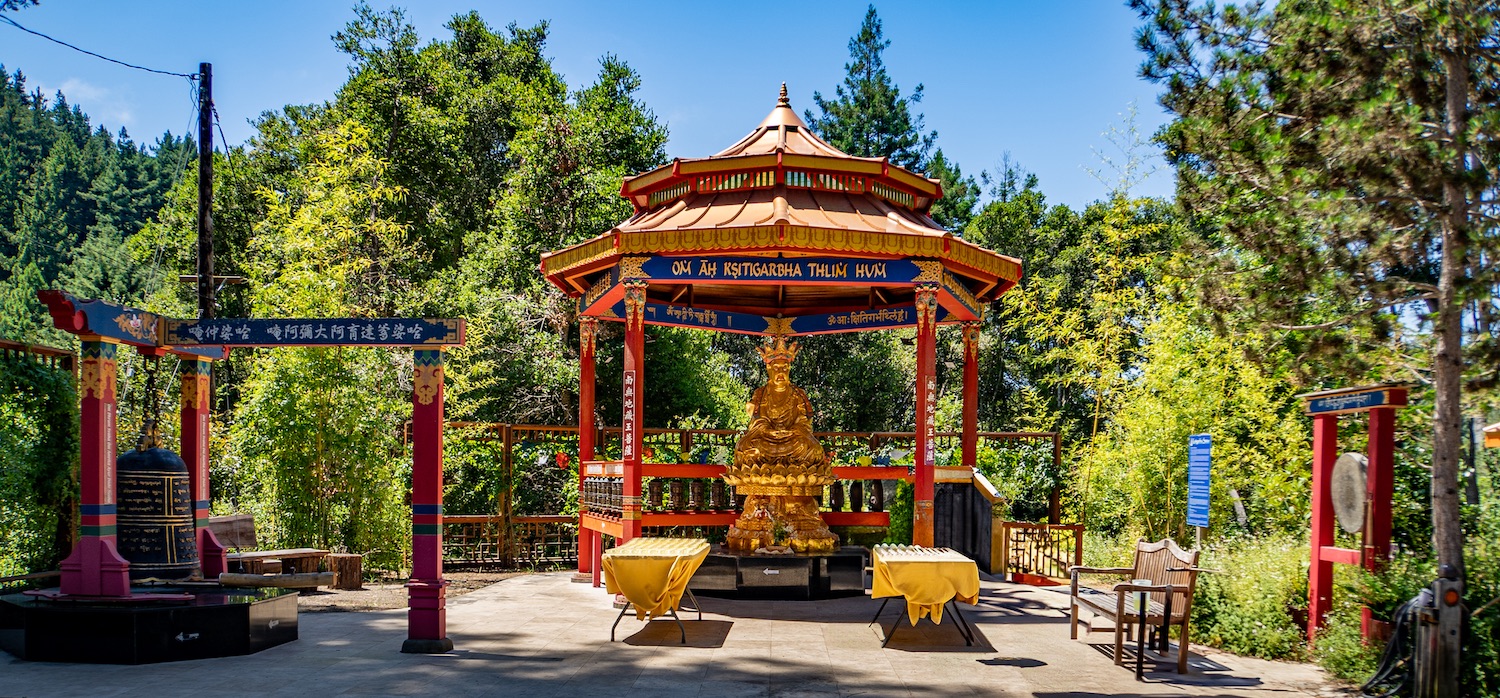
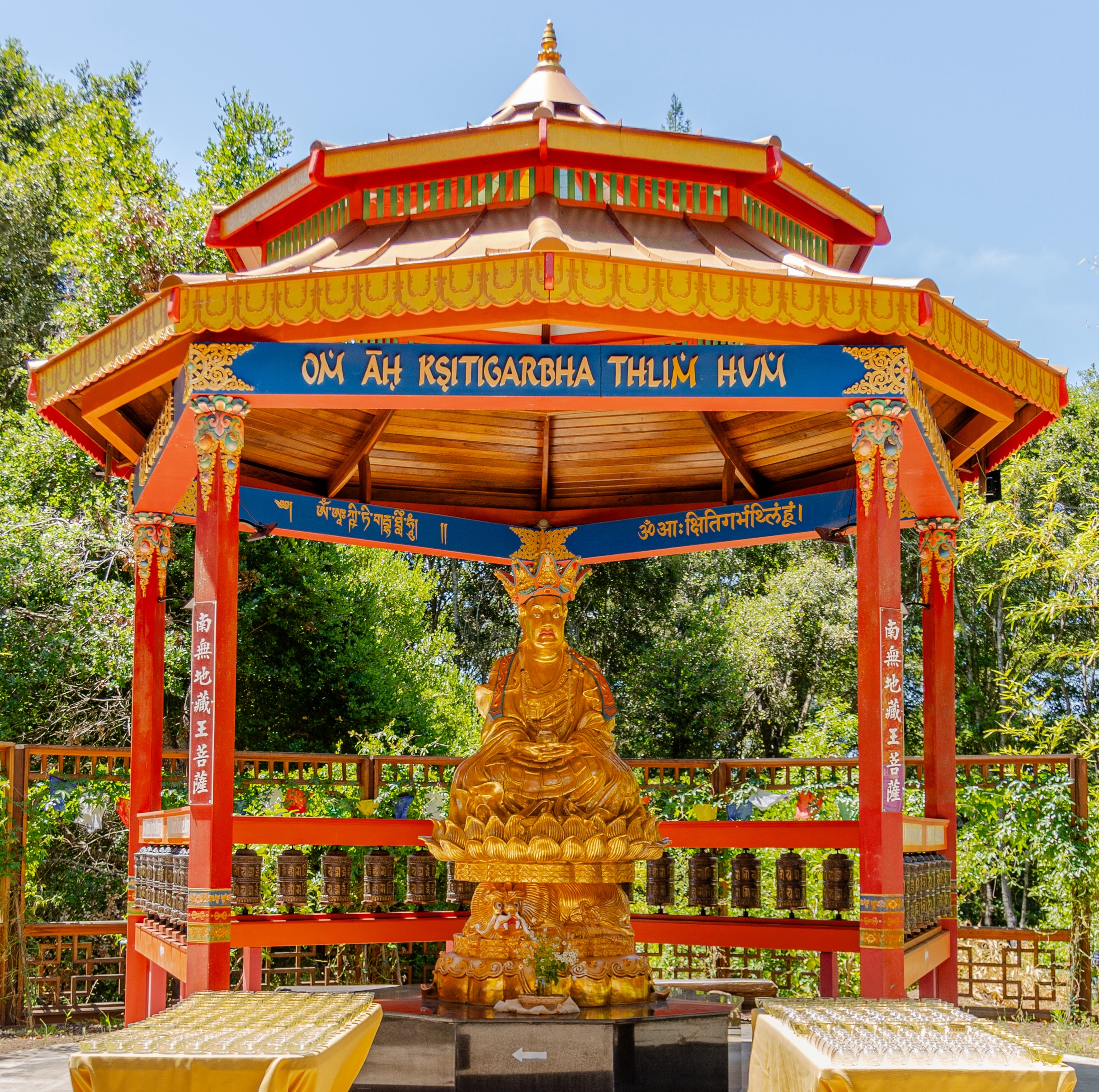
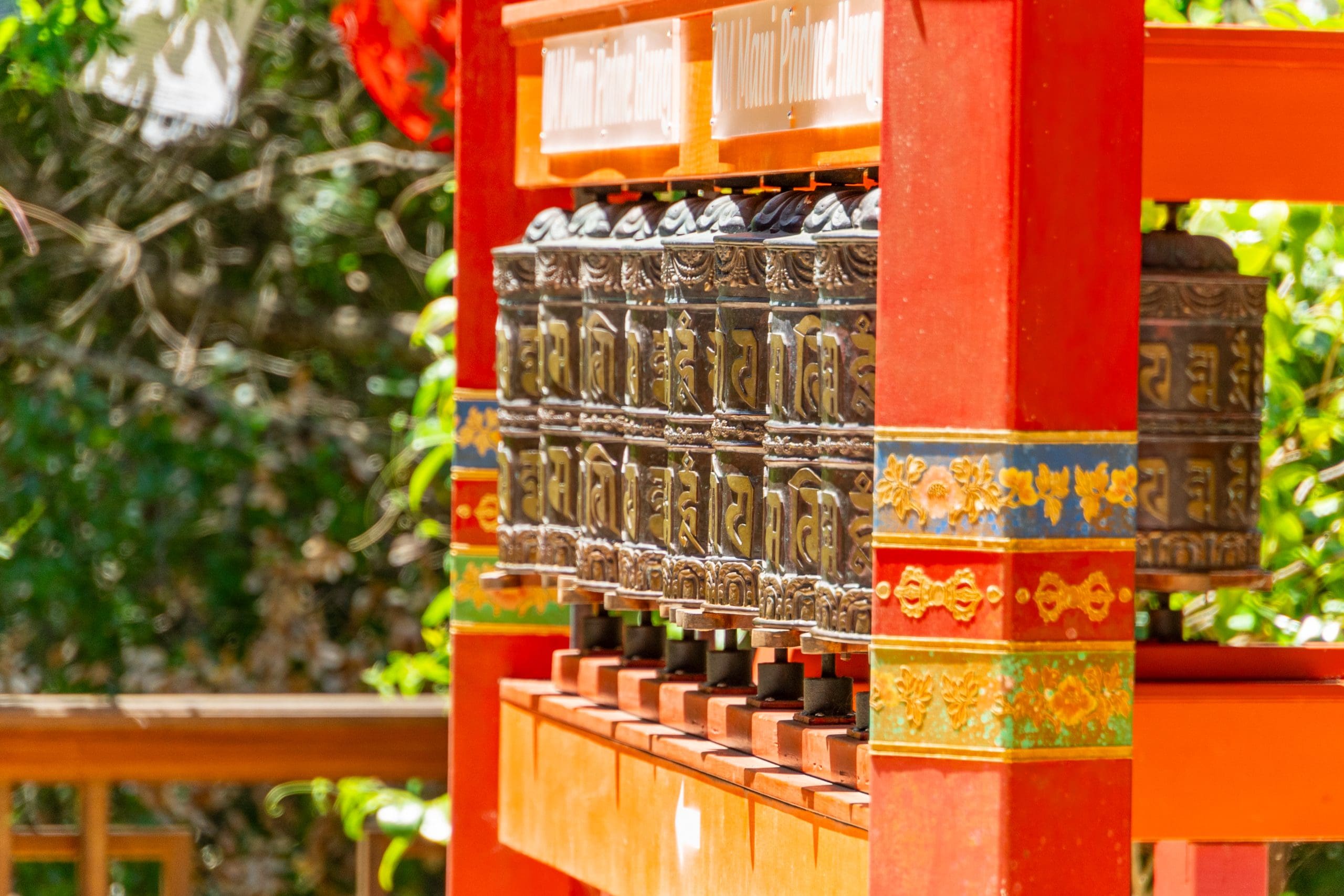
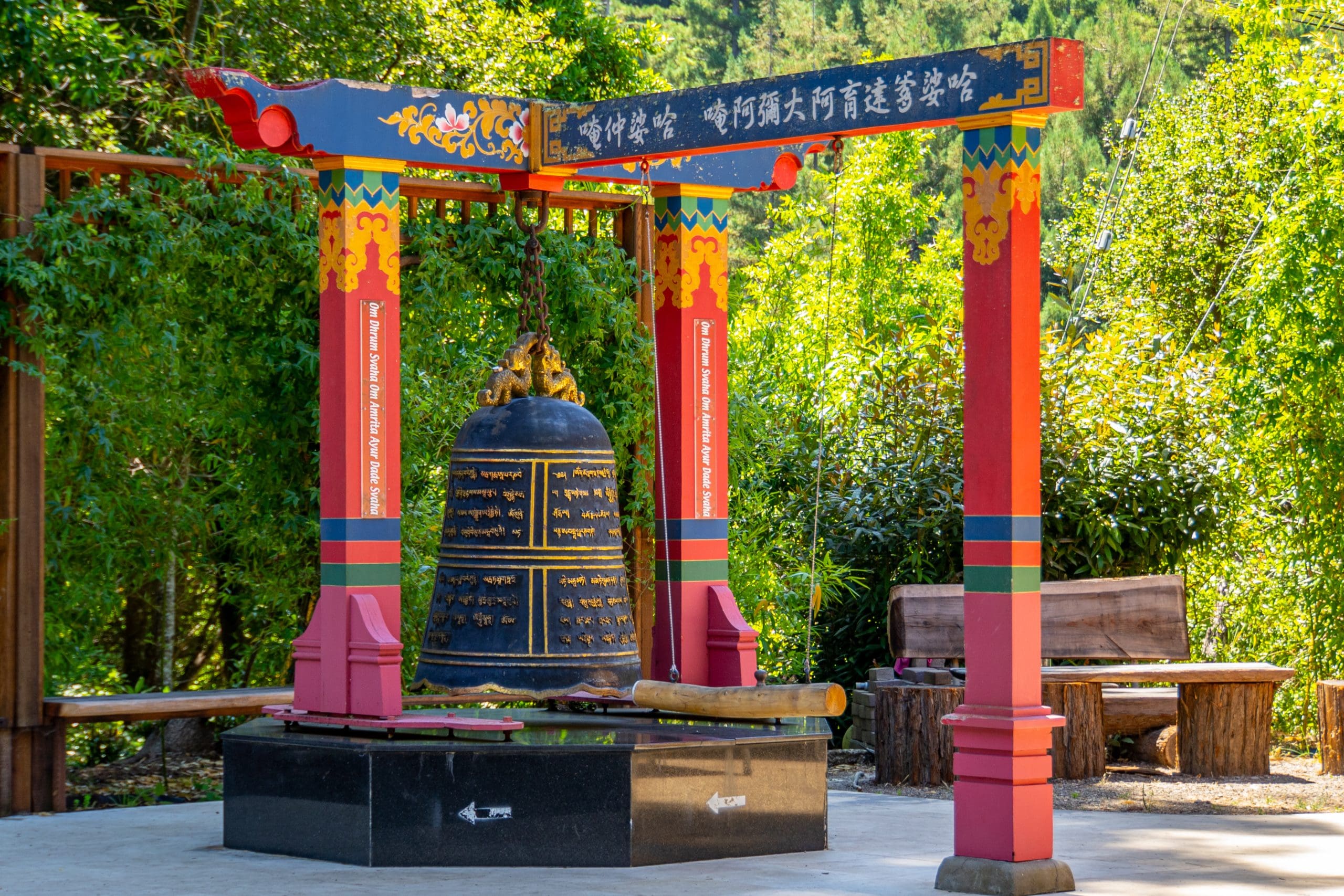
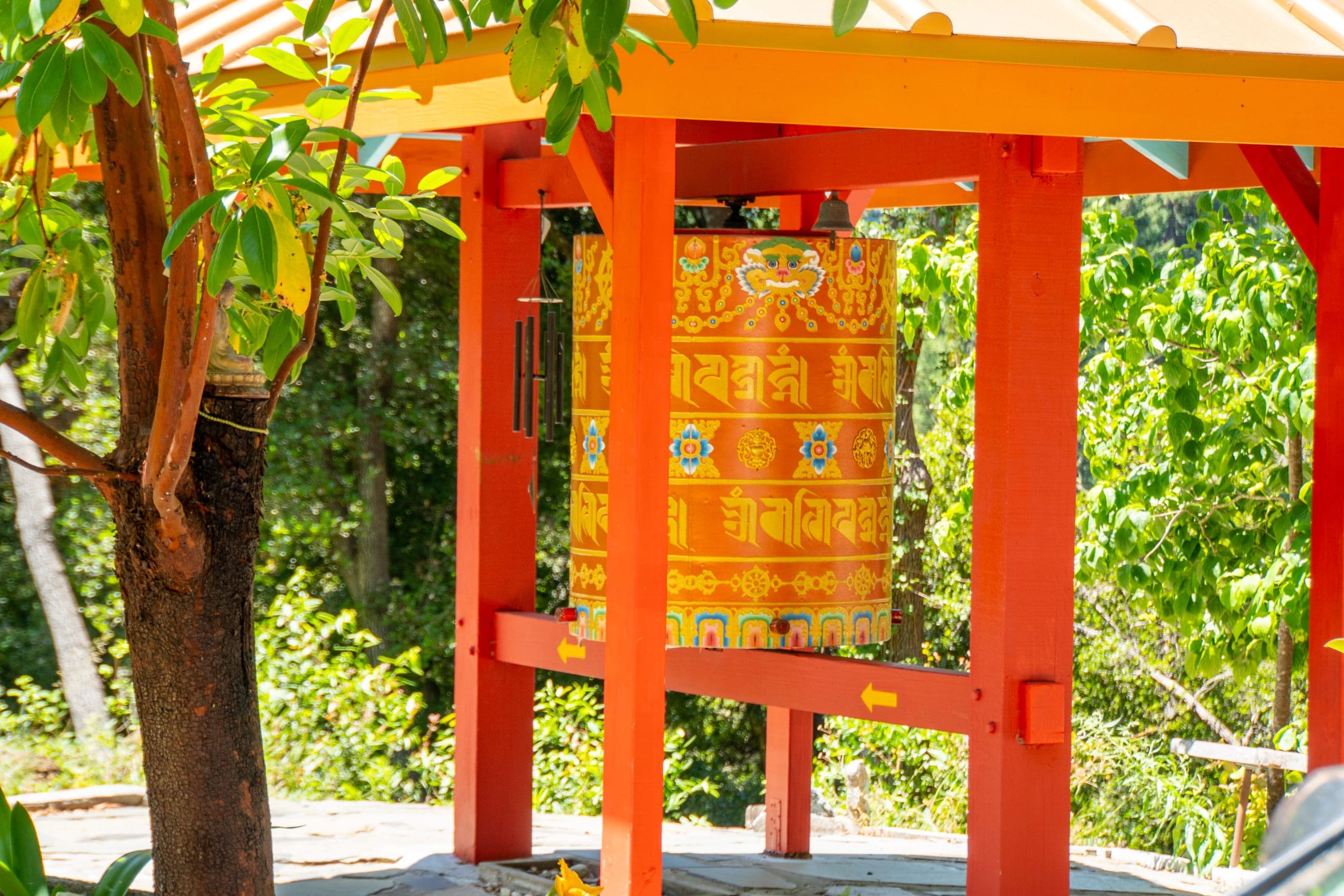
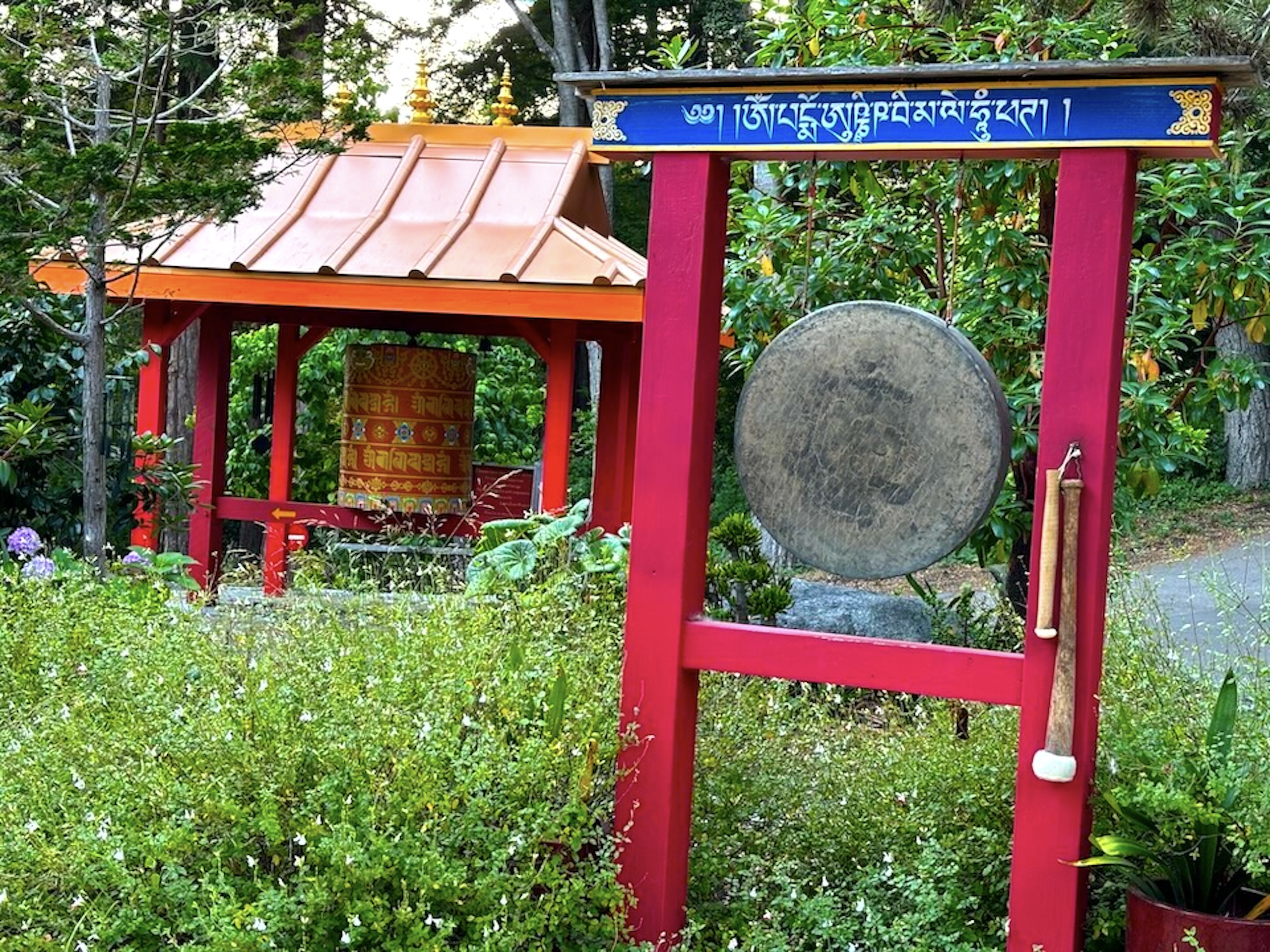

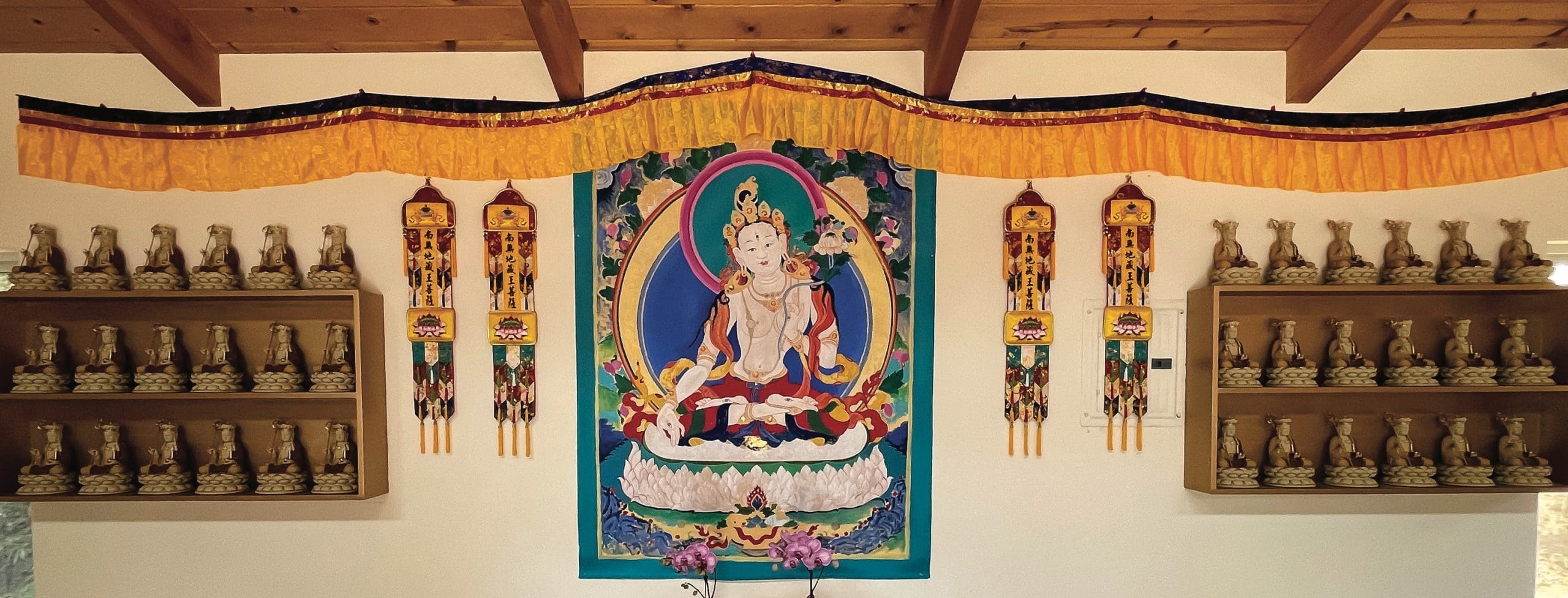
Kṣitigarbha is widely venerated in all traditions of Buddhism.
In the Chinese Mahayana tradition, he is known as Di Zang Wang Pu Sa (地藏王菩薩), Earth-Store Bodhisattva or Earth Treasure Bodhisattva. Also known as the “King of Great Vow,” he famously made the great vow, “If the hell is not empty, I shall not attain buddhahood.” His great vows are recorded in the popular sutra, Original Vows of Kṣitigarbha Bodhisattva Sutra, a Mahayana sutra spoken by Shakyamuni Buddha in the Trayastrimsa Heaven, where the Buddha went towards the end of his life and taught the Dharma in order to repay the kindness of his mother, Queen Maya. The sutra illustrates how Kṣitigarbha became a bodhisattva and recounts his efforts when he was a brahma woman in a previous existence, who sought the buddha’s help in freeing her mother from a suffering rebirth.
In the Japan, he is known as Jizo, relied upon by those who have lost their children, born or unborn. His name in Tibetan, Sa yi nying po (ས་ཡི་སྙིང་པོ), translates as “Essence of Earth.” He is one of the great eight bodhisattvas in the entourage of Shakyamuni Buddha.
Lama Zopa Rinpoche recommends reciting the Kṣitigarbha mantra and doing his practice to improve health and financial problems and also to avert disasters, such as earthquakes, hurricanes, and fires.
Rinpoche explains the benefits of relying on Ksitigarbha:
This practice is especially beneficial for those who have insurmountable problems, serious health problems, difficulties in big projects, and financial difficulties. I suggest they should recite either the long or the short mantra every day for protection, or at least four or five times or more, depending on the magnitude of the problems. This practice is also effective for people who want a good yield of their crops, and protection of their harvest and land. In the sutra of the bodhisattva Kshitigarbha are explained the extensive benefits that can definitely fill up the sky.
By making offerings to bodhisattva Ksitigarbha, whatever prayers you make become most unbelievably powerful—a hundred million times more powerful for success, and it is much more powerful than praying to other bodhisattvas. It is the most unbelievable for great success to happen as quickly as possible.
Thus Lama Zopa Rinpoche often advises that prayers to Ksitigarbha are much more powerful than those made to other bodhisattvas, emphasizing in the Kṣitigarbha Practice: “This mantra dharani is the best one to do for any problems in any situation. Even reciting four or five times, just a few times, is very powerful. [The sutra] talks about so much power, how important the bodhisattva is; even reciting or just thinking of the name of the bodhisattva is very, very powerful.”
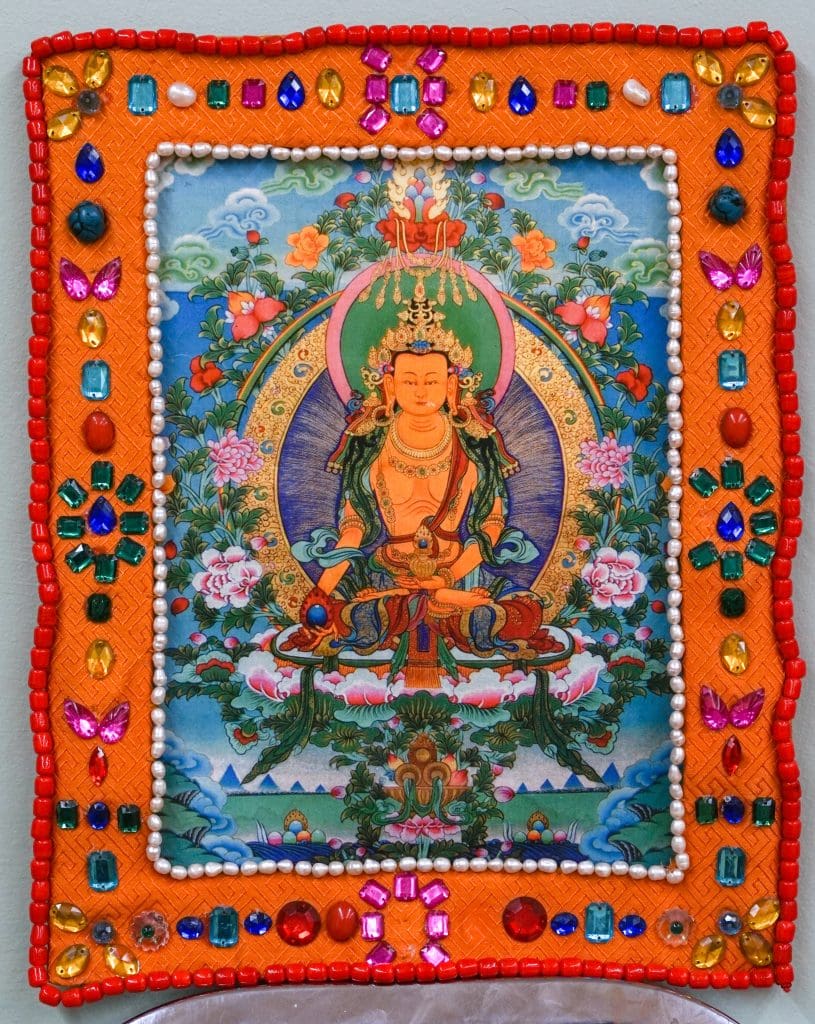
Reciting Holy Name
南無地藏王菩薩 Na mo da di zang wang pu sa (in Chinese)
Homage to Kṣitigarbha Bodhisattva
Mantras
OṂ ĀḤ KṢITIGARBHA THLIṂ HŪṂ
Practice and Sutras
Kṣitigarbha Practice – compiled by Lama Zopa Rinpoche, contains the Ksitigarbha long mantra from the Daśacakra kṣitigarbha nāma mahāyāna sūtra
108 Names of Arya Kṣitigarbha and the Dharani Mantra – contains the Kṣitigarbha middle-length mantra
Kṣitigarbha Ten-Wheel Sutra from the Mahayana Collection – In the wide-ranging discourse of the Kṣitigarbha Ten Wheels Mahayana Sutra, the Buddha expounds on the “ten wheels” that define a just king’s rule; the knowledge and qualities of a tathagata; the ethics, conduct and practices to be adopted by the Buddha’s ordained followers; the features and qualities of the three vehicles; the practice of confession; the ten virtues and their ripening results; and the ten perfections.
The bodhisattva Kṣitigarbha, for whom the sutra is named, features most prominently in the first two chapters of the sutra. Alongside the inspiring description of his inconceivable qualities is an account of the exceptional benefits of the mantra dharani which he received. The sutra tells us: “he is greater than all other bodhisattvas, and you should make offerings to him with great devotion.”
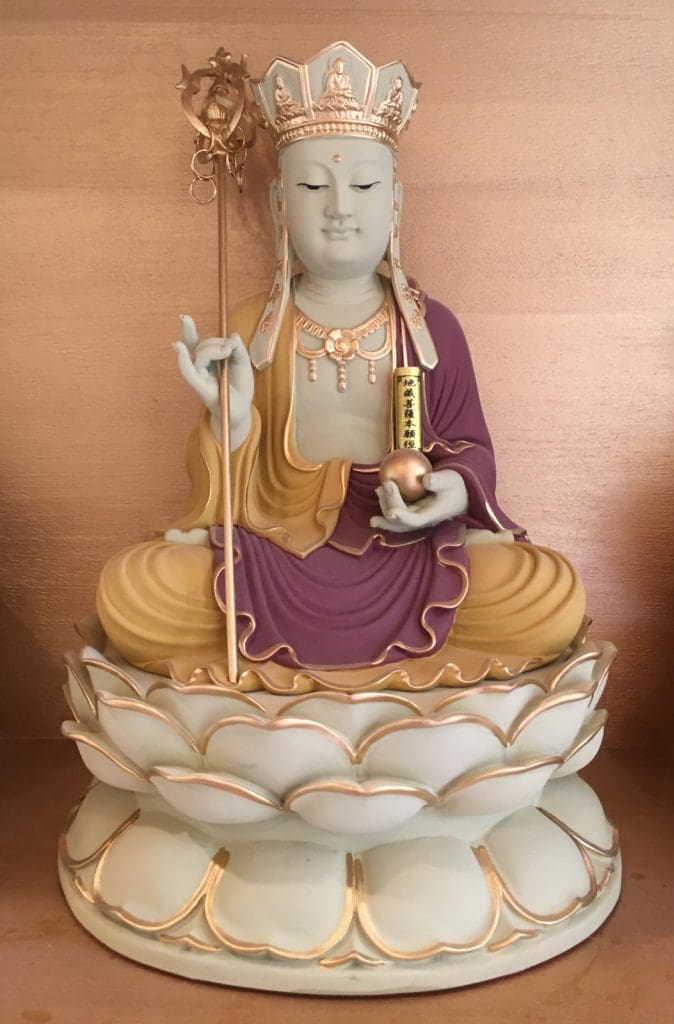 The golden Kṣitigarbha Temple houses 108 beautiful 18-inch Ksitigarbha statues.
The golden Kṣitigarbha Temple houses 108 beautiful 18-inch Ksitigarbha statues.
These statues can be adopted in order to create merit for a loved one.
Adopt a Kṣitigarbha statue with a sponsorship of $1080, or make a general donation here.
- By Check Payable to:
Land of Medicine Buddha
c/o Ksitigarbha Pureland - By Credit Card
- By PayPal
A variety of programs take place at Kṣitigarbha Pure Land and the Wish-Fulfilling Temple, such as the following:
- Waterbowl offerings
- TCM Clinics
- Ksitigarbha Festival Day
Program information is available on our All Programs page.
Join us to celebrate Ksitigarbha Festival Day!
September 6, 2025 * Saturday, 10am – 2pm
Register your participation here!
Monks from the Gyuto Tantric College will lead a special puja, 100 Torma Offering Ritual (Torma Gyatsa), to make offerings and requests to the enlightened beings and dedicate prayers for the benefit of all beings in the six realms.
The Origins of Ksitigarbha Festival Day
Kyabje Zopa Rinpoche has encouraged as part of the Vast Visions for FPMT to support, create, and display large thangkas, and to host thangka festival days where many people can gather to enjoy the beauty and power of the holy artwork, and participate in making offerings and other virtuous activities. At Land of Medicine Buddha, we hold two such events annually. We warmly invite you to join us in the celebration of Medicine Buddha and Ksitigarbha Festival Days!
In 2007, Lama Zopa Rinpoche advised the director of Land of Medicine Buddha to host a Ksitigarbha Festival Day together with Angela Wang and the Chinese community. Since then, we had celebrated Ksitigarbha in the 7th lunar month, which is associated with Ksitgarbha’s strong practice in his previous lives as a bodhisattva, particularly with his practice of filial piety and dedication to helping sentient beings in the lower realms. He famously made the vow:
“Only when all sentient beings are delivered, will I attain Bodhi; if the hells are not empty yet, then I will not attain Buddhahood.”
Since 2008, we celebrated Ksitigarbha Festival Day with special prayers to Ksitigarbha, mantra recitation, sutra reading, offering to the Sangha, offerings of plentiful food, flowers, and water bowls. We had also made offering of music and dance. Please enjoy photos of our previous Ksitigarbha Festival Days.
2008 | 2009 • 2009 | 2010 | 2011 • 2011 | 2012 • 2012 | 2013 | 2014 * 2014 | 2015 | 2016 | 2017 | 2018
Special Pujas on Ksitigarbha Festival Day
Practices focused on benefiting beings in all six realms, particularly the lower realms, are performed on Ksitigarbha Celebration Day. Two rituals commonly done in the Tibetan and Chinese tradition for this purpose are: 100 Torma Offering Ritual and Mengshan Food-Bestowal Ceremony.
100 Torma Offering Ritual (Torma Gyatsa)
The 100 Torma Offering Ritual involves making offerings to twelve types of guests, both the transcendental and the worldly. Offering to the transcendental guests invokes their blessings while offering to the worldly beings dispels harms and repays our karmic debts. The twelve types of guests are:
- Transcendental guests—lineage lamas, meditational deities, the Three Jewels, Dharma protectors, sages, and wealth deities
- Worldly beings—local deities, landlords, interferers, and spirits
- Sentient beings of the six realms—suras, asuras, humans, animals, and hungry ghosts
- Spirits to whom we owe karmic debts from our past negative actions such as killing, beating, and stealing
- Intermediate state beings and other remaining guests
Mengshan Food-Bestowal Ceremony
This is a unique food-bestowal ritual in the Chinese Buddhism tradition, which integrates the essence of Tibetan Buddhism, Chan (Zen), and Pure Land Buddhism. Through the offering of nectar (amrita) water consecrated with mantras, it provides relief to hungry ghosts and the spirits of the deceased. Making such offerings are no different from making offerings to all the buddhas in the ten directions, and show the practice of great compassion and that aspiring to bring all beings to enlightenment.
蒙山施食是漢傳佛教特有的施食儀軌,融合密宗、禪宗與淨土精神,


